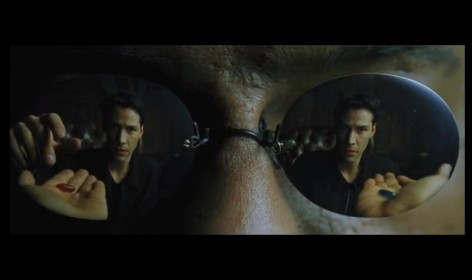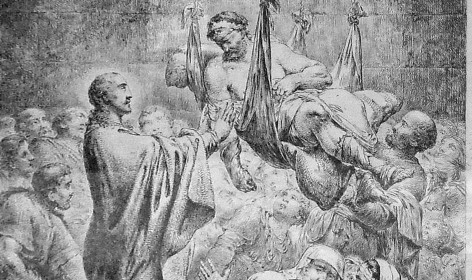Tag Archives: Theology
I have much more to say to you, more than you can now bear. – Jn 16:12

But when he, the Spirit of truth, comes, he will guide you into all the truth. – Jn 16:13 What is Truth? An exasperated Pilate poses the question, “What is truth?” (Jn 18:38). He did so because Jesus said, “Everyone on the side of truth listens to me” (Jn 18:37). So what is this “truth”? And why […]
- November 26, 2012
- / Category John 16, Ministry
- / Posted By Kevin Bennett
- / 1 Comment.
Romans 8:12-14 “Flesh and Spirit”. Do the translators understand?

Discerning the Worldview of the Translators…? The Bible talks about “the flesh” and “the spirit”. Various translations treat these concepts in subtly different ways, and in those differences there can be substantial theological impact. Irrespective of what we want it to say, it is important to comprehend what the original author meant by these terms, […]
- September 29, 2012
- / Category Commentary, Flesh, Ministry, Research, Romans 8, Spirit
- / Posted By Kevin Bennett
- / No Comments.
Genesis 2:2-3 – Why God rested

Why did God rest? We often ask our Biblical texts questions that they were not designed to answer. This can be ok sometimes, and it can yield information that is good and helpful. But at other times it can result in us reading the text in ways that were never intended, potentially obscuring or even […]
- September 19, 2012
- / Category Apologetics, Genesis 2, Research, Sabbath
- / Posted By Kevin Bennett
- / No Comments.
The Psychological Gospel

Can the Gospel be described in Psychological terms? The Gospel is not a matter of psychology. It is a message about the Kingdom of God: “Jesus is Lord”. But the contemplation of this, and the comprehension of it, can have profound psychological effects on the person concerned. This is because it matters that Jesus is Lord. It […]
- September 2, 2012
- / Category Commentary, Mission to the Marginalised, The Human Connection
- / Posted By Kevin Bennett
- / 1 Comment.
Isaiah: Hiddenness

Isaiah and the theme of Hiddenness In the Book of Isaiah there is a notable theme describing a kind of “hiddenness”, which refers to spiritual blindness and deafness by the people. It is a fascinating theme, and often misunderstood. This is a little journey through the Book of Isaiah tracking on this particular theme.
- August 20, 2012
- / Category "Eyes to see", Commentary, Hidden, Research, The Book of Isaiah
- / Posted By Kevin Bennett
- / No Comments.
Expect Miracles

Are the Biblical miracles just “a foretaste”, given to the early church? Can we expect miracles today? Understanding the Biblical miracles as an eschatological “foretaste” is helpful when considering the “consummated kingdom” to which they point, but such an understanding of miracles does not resolve the question of whether they are to be experienced today. […]
- August 12, 2012
- / Category James 5, Miracle, Reflection on Ministry, Research
- / Posted By Kevin Bennett
- / No Comments.
Is Ecclesiastes about feelings?

How are we supposed to feel when we read Ecclesiastes? I was asked whether the central message of the book of Ecclesiastes was “Pessimism”, or “Joy”. In other words, how are we supposed to feel when we read it? (Or perhaps, how did the author feel when it was put together?) I don’t think we’re […]
- August 1, 2012
- / Category Research, The Book of Ecclesiastes
- / Posted By Kevin Bennett
- / No Comments.
We are his “hands and feet” because we are the “body of Christ”? Oops, mixed metaphors!

As a member in the “Body of Christ”, am I His “hands and feet”? I was interested to hear someone recently suggest that we Christians are the “eyes”, “hands”, “mouth”, etc. of Christ. It’s a neat metaphor which indicates our responsibility to act, perceive and speak on God’s behalf, and to that extent I have […]
- July 27, 2012
- / Category Body of Christ, Commentary, Resurrection
- / Posted By Kevin Bennett
- / No Comments.
Infant Baptism: Yes, or No?

Should we Baptise infants or not? My view on Infant Baptism attracted some interesting feedback from a lecturer: “Some original and neatly articulated theological reasoning”. If I’m right, of course, it’s not “original” in the sense of being a new invention, but in the sense of being the reasoning which produced the Scriptures in the […]
- July 24, 2012
- / Category Baptism, Believer-Baptism, Commentary, Paedobaptism, Total Depravity
- / Posted By Kevin Bennett
- / No Comments.
What is a “Statement of Beliefs”, anyway?

“What we believe…” – Is that a creed? Is it a doctrine? Or is it just “What we could agree on at the meeting”? In this article I’m examining one specific article in one particular “Statement of Beliefs” to see what function it fills. I’ve been bothered by both the presence and the absence of […]
- July 22, 2012
- / Category Creed, Research
- / Posted By Kevin Bennett
- / No Comments.
What is the “Authority” of the Bible?

The Nature of the Bible’s authority So if the Bible comes from the “people of God”, rather than falling out of the sky directly from God, how can it be said to be authoritative? The Process As we have seen, the Bible came together as a process over countless generations, and human beings were most […]
- July 20, 2012
- / Category Apologetics, Authority (of the Bible), Bible References, Commentary
- / Posted By Kevin Bennett
- / No Comments.
Where did the Bible come from?

So where did the Bible come from? Rather than describing the process theologically, that is, in terms of how God spoke or what the role of humans was in the process, we can talk in terms familiar to the non-believer: Sociology. What is the sociological process involved in the formation of the Bible?
- / Category Apologetics, Bible References, Commentary
- / Posted By Kevin Bennett
- / No Comments.
Is the Bible actually “the word of God”?

In what sense is the Bible, “the word of God”? This sounds like a simple question to answer, but it is actually a long-running and very heated debate amongst Christians. Many claim that the Bible is “the word of God”, but they often mean different things by that statement.
- / Category Apologetics, Bible References, Commentary
- / Posted By Kevin Bennett
- / No Comments.
The Holy Bible: Offering An Explanation for the Atheist

What can an Atheist be offered about why the Bible is important to Christians? Shouldn’t we (Christians) be able to describe the Bible in terms that an Atheist can understand and appreciate, even if they don’t share our view of it’s spiritual authority? The pithy, “the Bible is the word of God” really won’t do […]
- July 19, 2012
- / Category Apologetics, Bible References, Commentary, Ministry
- / Posted By Kevin Bennett
- / No Comments.
Tithing: Unbiblical. Shouldn’t we prevent believers from doing it, then?

Is it Permissible to Tithe? Tithing is not a New Testament principle, and despite endless attempts to make it sound like Christians are obliged to tithe, the Good Book simply doesn’t say so. But does this mean that we must stop people from tithing? Is it spiritually dangerous? Is it like circumcision, about which Paul […]
- July 8, 2012
- / Category Commentary, Tithing
- / Posted By Kevin Bennett
- / No Comments.
Has the Eucharist been redefined?

Does the Roman Catholic Church still hold to Transubstantiation as a doctrine? I attended Midnight Mass at the beautiful St Mary’s Church in Ipswich on Christmas Eve 2011. I thoroughly enjoyed it, and will do it again this year. A couple of things caught my attention, and in my interest as a student of the […]
- June 18, 2012
- / Category Commentary, Eucharist, Sacraments, Transubstantiation
- / Posted By Kevin Bennett
- / 2 Comments.
One Church, Across all Time

If there is “One Church”, and there always has been only one, then surely it’s the same Church…? I stumbled across a wonderful expression of the “One Church” phenomenon in a theological textbook. I gladly receive it and add it to the wonderfully compelling image of “One Church”: we are part of the same church […]
- June 15, 2012
- / Category Body of Christ, Church, Church Group, Commentary, Reflection on Ministry
- / Posted By Kevin Bennett
- / No Comments.
Ecumenism in Roman Catholic theology: Lumen Gentium analysed for Ecumenism.

Summary – Lumen Gentium as an Ecumenical document Lumen Gentium, (“Light of Nations”, Vatican II, 1964) changed nothing in the ecclesiology of the Roman Catholic Church, and it was designed that way. But the whole process of Vatican II, including this document, did prove to be a catalyst for ecumenical dialogue in many ways. Again, this […]
- June 2, 2012
- / Category Ecumenism, Research
- / Posted By Kevin Bennett
- / No Comments.
Gospel of John

The Gospel of John: Many people’s favourite book, but scholars neglected it for centuries!
- May 24, 2012
- / Category 3 Words that will forever change the way you read the Gospel of John, Research, The Gospel of John
- / Posted By Kevin Bennett
- / No Comments.
Recent Posts
- Addiction: How to Help
- … and this just in: News from the Streets of Ipswich. Issue 23
- What Happens When We Die, and Where are my Loved Ones?
- Seeking the Kingdom
- If it is by the Spirit of God that I drive out demons, then the Kingdom of God has come upon you – Matt 12:28
Tags
| S | M | T | W | T | F | S |
|---|---|---|---|---|---|---|
| « May | ||||||
| 1 | 2 | 3 | 4 | 5 | 6 | |
| 7 | 8 | 9 | 10 | 11 | 12 | 13 |
| 14 | 15 | 16 | 17 | 18 | 19 | 20 |
| 21 | 22 | 23 | 24 | 25 | 26 | 27 |
| 28 | 29 | 30 | ||||




Trinity: Perhaps the JW’s believe it?
Trinity: Have the JW’s withdrawn their objection? I’ve given Roman Catholic theology a few critiques, so it’s only fair that I publish something different. I recently wrote this essay to refute the 1989 Jehovah’s Witness tract entitled, “Trinity: Should you believe it?” My overall answer is that the tract was badly misleading and inaccurate. It […]
- October 7, 2012
- / Category Commentary, Jehovah's Witnesses, Research, Trinity
- / Posted By Kevin Bennett
- / No Comments.
Read More